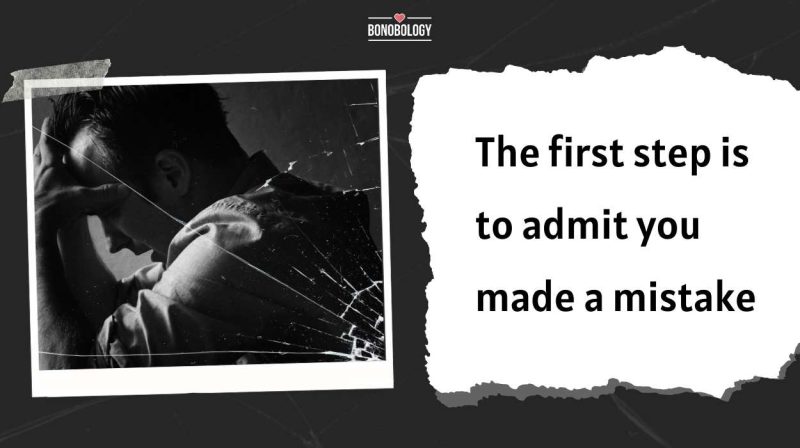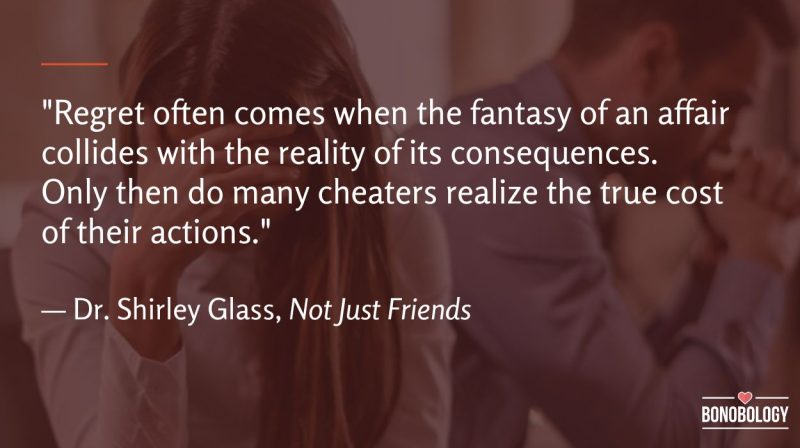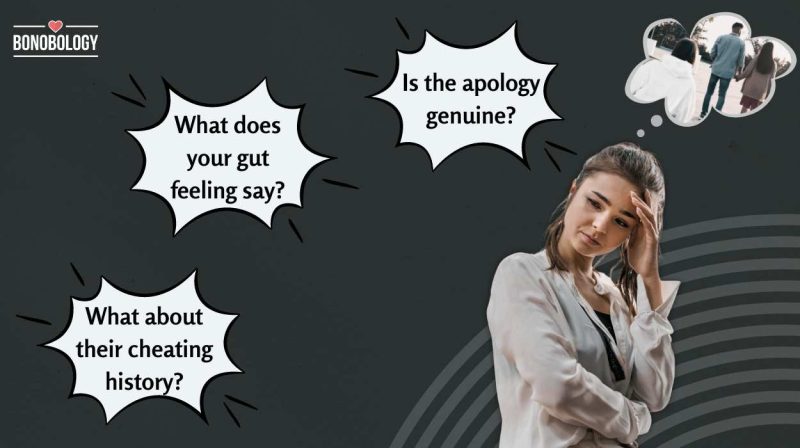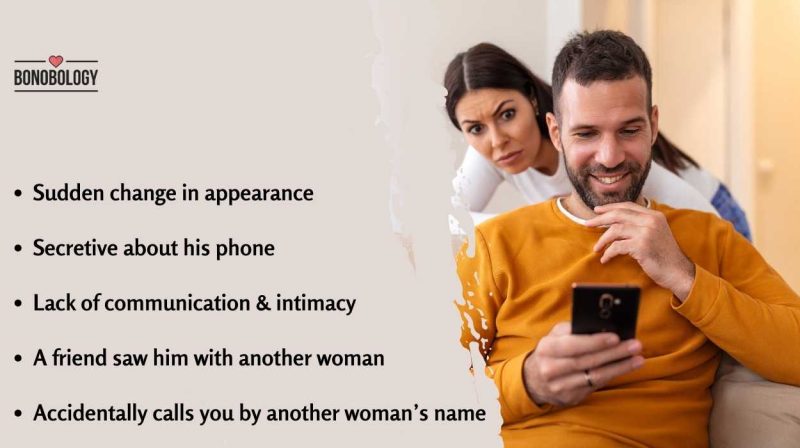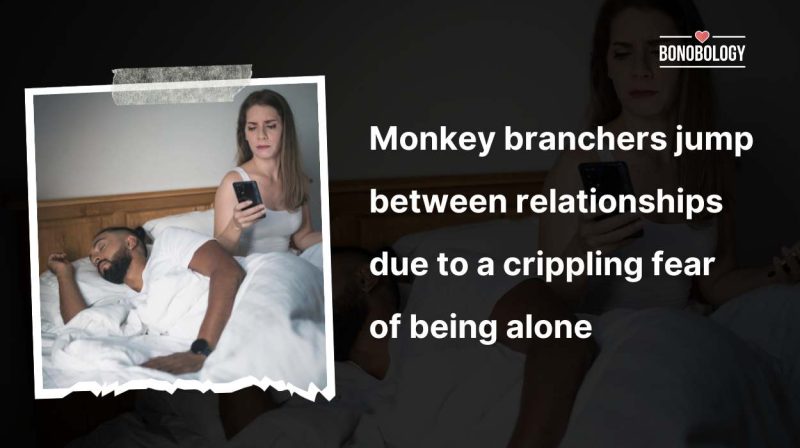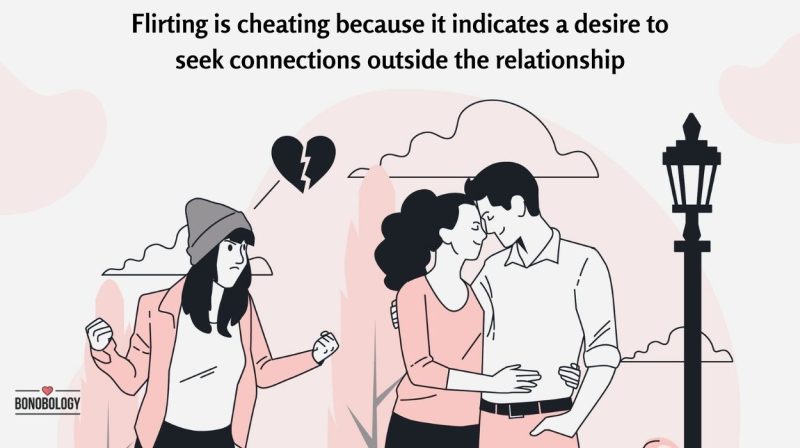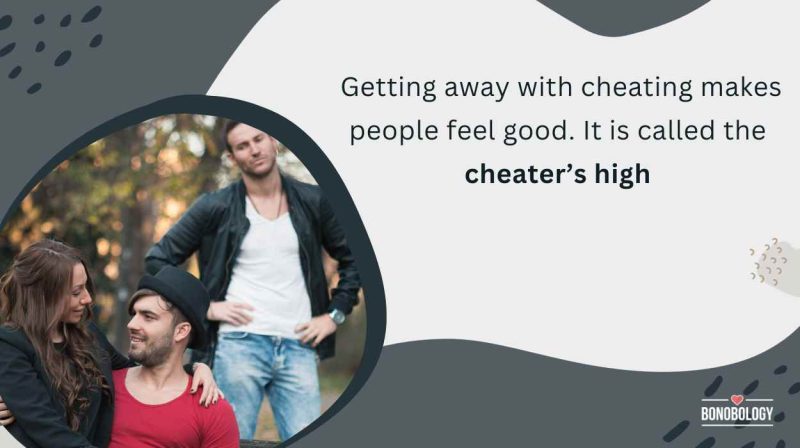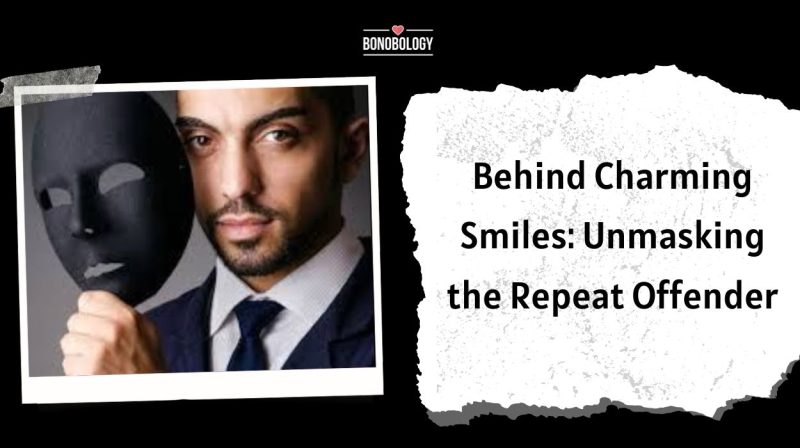After infidelity is discovered, we usually think that the partner being cheated on is the only one hurt. Don’t be surprised if we tell you, cheating hurts the cheater too. Yes, you heard it right, the cheater/unfaithful spouse might seem all normal and carry on with the cheating until it is discovered. But once the deception comes to light, that’s when they go through different stages of guilt after cheating, which can prove to be quite a rollercoaster ride of emotions.
Regardless of how an affair is discovered, the revelation lends a huge blow to a couple’s relationship. In the case of married couples, the ripples can be felt in the family dynamics as well. It affects the spouse who was betrayed, children, parents, in-laws, and everyone around them. The post-affair discovery is when the metamorphosis begins and signs of cheater’s guilt begin to appear. In fact, people in affairs may feel increased anxiety or depression driven by a guilty conscience even though they are not caught in the act yet.
While the devastation brought on by an incident of infidelity remains in focus, the state of mind of the cheating partner is often pushed to the sidelines. But that doesn’t mean that a cheater remains unfazed in the aftermath of their transgression coming to light. Let’s shine the spotlight on the different stages of guilt after cheating, with expert insights from consultant psychologist Jaseena Backer (MS Psychology), who is a gender and relationship management expert.
How do you deal with guilt after cheating?
Table of Contents
When you are trying to hide an affair, it doesn’t raise the question of ‘whether’ you will get caught, but rather ‘when’ you will get caught. It’s only a matter of time. Cynthia’s secret affair with a coworker didn’t remain under the cover for long. After cheating on her fiancé, the remorse and guilt weighed heavy on her mind. She didn’t leave the house for days, refusing to see anyone. It seemed like this depressive episode would put not only her marriage, but also her job at stake.
You see, it’s a sign of hope that you are feeling terrible for putting your partner through such misery and humiliation. But at the same time, it’s important to pull yourself together before the symptoms of guilt after cheating take a toll on every aspect of your life. How about you start by not being too harsh on yourself? So you had a one-time lapse in judgment. You should have known better. But we are all inflicted with human flaws. It doesn’t mean that you are a bad person by nature.
The first order of business is to accept that you made a mistake and there’s no way to go back in time and undo it. You can’t let that define you or the course of any of your relationships. Before you get stuck in the stages of a vicious betrayed spouse cycle (discovery, reaction, decision-making, moving on), shift your focus entirely on your next bit of action. Are you willing to stay in the relationship and mend it? Then bring on all the suave moves up your sleeve to convince your partner that you are ready to go to any length to make things right.

Now you don’t know how badly they will react, whether they will ever take you back or not. The very thought of that confrontation might trigger anxiety after cheating on partner. But you do your bit with full honesty and leave the rest to them. Mean it when you say sorry; and keep your word of rebuilding trust. Ask your partner what they would like you to do for damage control.
And last but not least, be gentle with yourself. Take notes from the mistakes. Change a thing or two about yourself if that’s what it takes. But constantly judging and beating yourself up will make the anxiety even worse. Talk to a trusted friend about your side of the story. Visit a therapist maybe, whether alone or with your partner. If it’s help you’re looking for, skilled and experienced counselors on Bonobology’s panel of experts are here for you.
Stages Of Guilt After Cheating – What A Cheater Goes Through
While the initial thrill of an extramarital affair gives a certain high to the cheater, the post-affair discovery prompts the cheater to go through stages of guilt after cheating. These cheating guilt signs are filled with a series of emotions like shame, worry, regret, confusion, embarrassment, self-loathing, and anxiety. These emotions can be counted among the signs he cheated and feels guilty or she cheated and is now consumed by guilt over her actions.
Andrew, one of our readers from New York, has recently confessed about a year-long affair to his spouse. He says, “I got severe anxiety because I cheated. I couldn’t hold it in any longer. So, I had to come clean to my husband, confess to cheating, and end the other relationship. But now I am even more anxious, worrying about what if he leaves me.” People in affairs may feel increased anxiety or depression, although nobody is empathetic toward their troubled hearts.
When an affair is discovered, the enormity of the impact of their actions truly hits the cheater and they feel anguish and the sting of their bad decisions. These swirling thoughts and rollercoaster of emotions can take a toll on the cheater’s mental health. In some cases, the impact may be so severe and apparent that it leaves you wondering, “Can guilt of cheating cause depression?” The answer is yes; there is enough scientific evidence to suggest that feelings of guilt, shame, and remorse after cheating can cause depression.
Related Reading: Infidelity Recovery Stages To Heal From An Affair
However, one must remember that a cheater is always aware of the potential hurt and damage their actions can cause. But since the repercussions are not imminent, they may carry on with the infidelity without feeling remorse because it fulfills certain needs, conscious or subconscious.
However, the discovery of an affair subverts this dynamic. The thrill, excitement, or whatever other need was driving the infidelity takes a backseat and the guilt takes over. Here it is also important to be cognizant of the guilt vs remorse differences. The symptoms of guilt after cheating can be at best described as an uncomfortable reminder of having done something wrong whereas remorse pushes you to take concrete steps to undo the damage you have caused.
Remorse makes you seek forgiveness whereas guilt leads to avoidance. This explains why a cheating person shows no remorse if they only show signs of cheater’s guilt. Based on this understanding, let’s look at the different stages of guilt after cheating, derived from the personal experiences of the people we’ve spoken to. These are the phases you can expect a cheater to go through post-discovery of the affair:
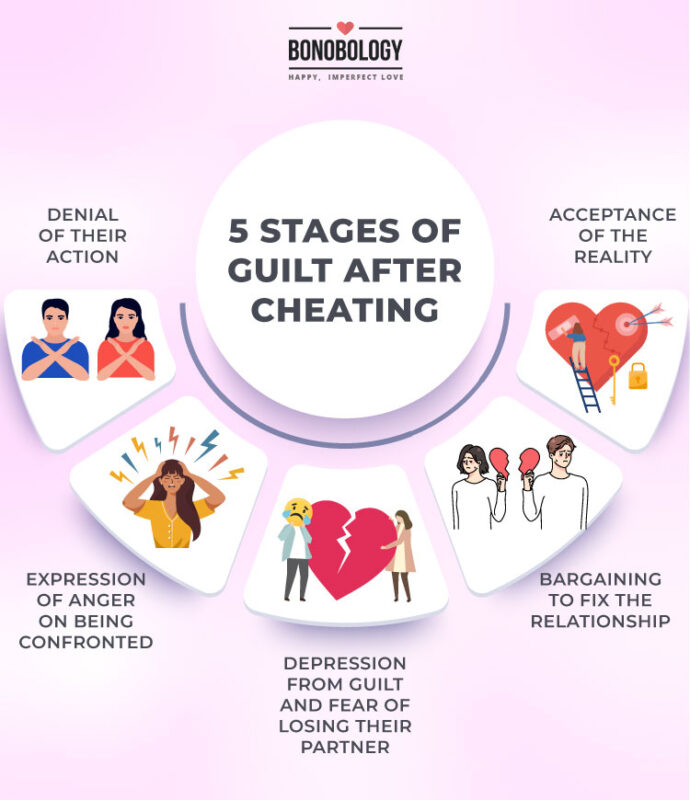
1. Denial
One of the stages of guilt after cheating is denial. It comes right at the beginning of the betrayed spouse cycle after the affair is discovered. When the unfaithful spouse is busted, they respond with denial. As the guilt of cheating creeps in, they start practicing the ‘art of deception’. They try to cover up the truth by showing cheating guilt signs because they want to stick to denial after cheating. They will try and attempt deception in different and dubious forms.
Julia, 28, a dancer, says, “I confronted my husband after learning about the affair he was having with his old flame, and he denied it. I showed him all the evidence, but he denied it again. I took him out for coffee the next day and invited the other woman too, but he still didn’t admit to having cheated on me. He tried deceiving me over and over again and that’s when I realized that he is just a coward who only thinks about himself.” A cheater’s behavior in the denial stage may leave you wondering why a cheating person shows no remorse.
Jaseena says, “During the denial stages of guilt, the cheater does everything to show that they didn’t do anything wrong. The cheater tries to mask it and tries to act like an innocent, loving partner. As the anxiety after cheating on partner kicks in, they try to cover up even minor things. They camouflage their mistakes and use retorts like “No, it’s not how it looks” or “You’re just assuming things” or “How could you even think I’d do such a thing?” A cheater goes into denial after cheating, hence dismissing the very act of cheating and its impact.”
2. Anger
Anger is a pretty obvious cheating guilt sign. Let’s be honest, no one wants to get caught in the wrong, especially not a cheater who has so much at stake. This particular stage of guilt after cheating is also referred to as the ‘withdrawal stage’. In this stage of guilt after cheating, the cheater is in a funk. The signs of cheater’s guilt are often obscured by anger, which is at the fore.
They are now deprived of the ‘high’ their affair partner was providing, they feel they have been cut off from the other person. They go through anxiety and guilt after cheating, and a lot of relapses occur. The resentment and anger after cheating make them snappy every time you try to have a conversation about their cheating episode. The stages of anger after infidelity come quickly after denial and can linger on for quite some time.
Jaseena says, “The anger after cheating is equal and ancillary to the denial after cheating. By showing honesty and sincerity, the other spouse stands their ground, which makes the cheating person go into anger mode. And the stages of anger after infidelity are unleashed. This outburst occurs because so many things have gone wrong on their side.
“The foremost point is that the comfortable relationship that the cheater had outside the primary relationship cannot be continued. Anger can also arise from the fact that the affair partner is probably left on the fence, not knowing what is happening in the family that discovered cheating. Add to that, their spouse or primary partner may want to know details of the affair, which can make a cheater feel pushed to a corner, resulting in angry retorts.
“The cheater has to put up with other kinds of emotions that may come from their partner. The partner may bring up a lot of things from the past, point out how they have been completely faithful, or highlight the many other consequences of infidelity, and that’s when the second wave of anger kicks in. This creates a whirl of anxiety and guilt after cheating, which results in anger. This is also a stage of helplessness for the cheater, and often anger is an emotion that stems from helplessness.”

3. Bargaining
Bargaining after cheating is one of the most important stages of guilt after cheating. This is the phase when one decides either to make the relationship work after infidelity or let it fall apart completely. During this particular stage of guilt after cheating, the relationship is stagnant. The anxiety and the guilt after cheating and the intensifying of grief after cheating result in no progress in the relationship. The cheater isn’t doing anything to make the relationship work nor are they willing to talk about the affair.
“It’s been a month since the confrontation, my husband and I rarely speak. I don’t see the point of being in this marriage. I would have thought of giving it a try but then he isn’t making any efforts. He doesn’t want to speak about the affair nor does he want to talk about where our relationship is at. I just don’t see the signs he cheated and feels guilty. There was a time when he used to say, “I get anxiety because I cheated.” But now it seems to be mellowing down. So I guess we are on the brink of falling apart and it looks like a better option to me,” says Erica, a 38-year-old researcher.
Jaseena says, “Bargaining after cheating occurs when the cheater knows the game is up and that they need to sustain the marriage. When bargaining after cheating starts, the cheater will probably go on their knees or make promises of mending ways, asking for one last chance.
“They may say things like “I will never do that again, I don’t know what happened to me, I slipped.” Or they could go to the other extreme and say, “You didn’t have time for me”, “I cheated because you were not loving enough”, “You didn’t respect me”, “There was not enough sex in the marriage, so I turned to someone else for my needs. It was purely sexual and nothing else.”
“They come up with some form of bargaining after cheating to fit back into the relationship. When this kind of bargaining after cheating doesn’t work out, they may say, “I am done with this relationship”, which serves as an ultimatum to the partner. They do this so that the partner changes their stand and gives them one more chance. The bargaining stage best reflects the guilt vs remorse in the wake of cheating.”
Related Reading: 6 Cheaters Tell Us How They Feel About Themselves
4. Depression
Can guilt of cheating cause depression? Yes, this stage of guilt is also referred to as the ‘mourning phase’. This is also where you will begin to see the signs he regrets cheating or she is ashamed of betraying your trust. This stage of guilt after cheating is triggered when the cheater starts realizing that they have lost the trust and respect of their loved ones. They start feeling guilt, shame, anger, and resentment, all at the same time, and it reflects in their behavior after getting caught cheating. Depression and remorse after cheating is very real, and that’s what we see in this stage.

Depression is almost an inevitable rite of passage as you cross the stages of guilt after cheating. Explaining why that is, Jaseena says, “Depression could happen in two situations. First, where the cheater has lost the other partner who they genuinely loved, as well as because of the danger of losing their primary partner who they may also love.
“Second, depression could occur since they can no longer be with the other partner because of the bargaining they had to do with the primary partner. When bargaining after cheating happened, their primary partner probably asked them to cut ties with their affair partner. This negotiation might cause grief after cheating. Besides, depression could also stem from having been caught in the wrong.
“The future of the relationship after cheating most commonly rests with the partner who has been cheated on. This leads to the person experiencing grief after cheating, and puts them in a hopeless, helpless situation after the negotiation. The cheater might have had to accept certain conditions during the negotiations, which may not be acceptable to them, but which they had to agree to in order to sustain the relationship. This helplessness could lead to a depressive state.”
Related Reading: A True Account of Infidelity in a Marriage

5. Acceptance
After a long haul of denying and blaming, going through the first and second waves of anger after infidelity, and all the emotional turmoil the cheater goes through, they finally come to terms with all that has transpired. In other words, they come to acceptance after cheating. This stage of guilt after cheating is experienced by the cheater after they realize that they cannot control the consequences of their actions.
Jaseena says, “The acceptance after cheating can come in during depression. When the cheater realizes that they have fought their battles and cannot control how the situation plays out, that’s when they start accepting. They understand nothing is going to be the same because of the one step they took. After all the struggle and grief after cheating, they finally accept the fact that they were responsible for everything.
“Until they reach the stage of acceptance after cheating or just before the stage of depression, quite often the cheater blames their partner, giving several excuses and justifications for having cheated on them. It’s when nothing is working in their favor and nothing is in their control that they finally accept the underlying truth.”
Effects of an extra-marital affair shake up everything for the hurt partner and the cheater. Infidelity is never easy to deal with. It is a destructive force that changes the perception of the hurt partner and the cheater about themselves and the world. How cheating affects the cheater is complicated and painful.
If you’re considering betraying your spouse or already are, we hope this article will give you the courage to begin thinking about the cost of your affair. In either of the scenarios, your relationship is in trouble. No matter how you look at it, the bottom line is that cheating affects the cheater and all the important people in their life.
FAQs
There could be many reasons behind such an action. Perhaps you are looking for affection and attention that is lacking in your relationship. Maybe you love your partner very much but you are not sexually compatible with them. It’s also possible that you couldn’t resist the temptation and gave in to lust even though cheating on your partner was never your intention.
The guilt of cheating might fade away with time if your partner gets ready to forgive you and make a fresh start. If they refuse to get back together after your infidelity or they use the incident as ammunition in every fight you have after that, it might be difficult to ever get over the cheating guilt.
Be gentle with yourself. Try to accept the fact that it was a mistake and that you are entitled to one mistake. What matters now is how you proceed to save your relationship from the aftermath of this infidelity. Even if you and your partner split, try to learn from this lapse in judgment and make it a point to avoid the same pattern in the future.
It’s Hard To Gain Your Partner’s Trust After You Have Cheated – 12 Ways To Do It!
Your contribution does not constitute a charitable donation. It will allow Bonobology to continue bringing you new and up-to-date information in our pursuit of helping anyone in the world to learn how to do anything.

